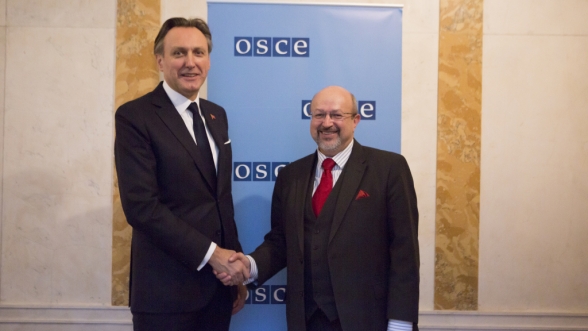This year’s meeting, which brought together 57 OSCE member states, started by the meeting of the Standing Committee of the OSCE Parliamentary Assembly, which welcomed the possibility for establishing temporary committee that would address the issue of migration crisis, one of the greatest challenges at the moment.
Mr Gernot Erler, Special Representative of the German Federal Government had a key statement at the OSCE PA Winter Meeting. He spoke on priorities of the German presidency and pointed out the most important topics that the Germany would address in the period to come. With regard to that, Mr Erler stressed that priorities of the German presidency rested upon the restoration of dialogue, rebuilding of trust and maintaining security in the OSCE field. He reminded of the need for undertaking concreate steps in resolving the frozen conflicts and dangerous crisis in Ukraine. Pointing out the importance of constant addressing of the crisis in Ukraine, Mr Erler said that Germany was ready to continue organising meetings of conflicting parties within the Vienna process, whose initiator was OSCE PA President Emeritus and President of the Parliament of Montenegro Mr Ranko Krivokapić. Additionally, they stressed the need for greater involvement of member states in the human rights field, welcoming the cooperation with the OSCE independent institutions addressing this issue.
President of the Parliament of Montenegro Mr Ranko Krivokapić had a meeting with OSCE Secretary General Mr Lamberto Zannier, discussing with him the current political developments in Montenegro, The President informed him on the autumn protests and establishment of the parliamentary dialogue, with the support of the European Union. The fact that presidents of parties gathered around the table and suspension of the parliamentary dialogue. They mutually stated that free and fair elections were fundamental value that OSCE protected, and many separate institutions in the OSCE were devoted to this: OSCE Parliamentary Assembly, ODIHR, OSCE's Representative on Freedom of the Media and other. They stated that Montenegro was in front of the great challenge to provide all citizens with their fundamental right to freely express their will and obtain the government as undisputed expression of their votes. Without that, there are no basis conditions for democracy, permanent stability or prosperity of the state. Secretary General Zannier promised that the OSCE would help to Montenegro in order to achieve free and fair elections. He voiced gratitude to the OSCE PA President Emeritus for all his work in the OSCE so far, and for initiating and leading parliamentary dialogue in Montenegro.
They agreed that it was necessary to work a lot in the field of the rule of law in the period to come, as well as for providing free media and freedom of expression, because, aside from being the key principles in the enlargement process, free media are reflection of democracy in a country. In addition, the interlocutors pointed out the importance of full application of electoral legislation with the aim of holding fair and free elections which would be recognised by all contestants of the election process, as well as the need for regaining confidence in election process.
The continuation of the joint session is expected for tomorrow, when a separate debate on the topic of migration will be held.
Aside from President Mr Ranko Krivokapić, MP Mr Branko Čavor is also participating in the 15th Winter Meeting as a substitute to permanent member of the Delegation.









